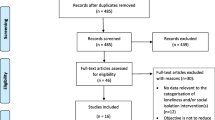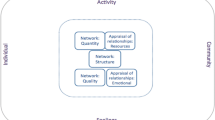Abstract
Background
No individualised standardised measure of staff support for mental health recovery exists.
Aims
To develop and evaluate a measure of staff support for recovery.
Method
Development: initial draft of measure based on systematic review of recovery processes; consultation (n = 61); and piloting (n = 20). Psychometric evaluation: three rounds of data collection from mental health service users (n = 92).
Results
INSPIRE has two sub-scales. The 20-item Support sub-scale has convergent validity (0.60) and adequate sensitivity to change. Exploratory factor analysis (variance 71.4–85.1 %, Kaiser-Meyer-Olkin 0.65–0.78) and internal consistency (range 0.82–0.85) indicate each recovery domain is adequately assessed. The 7-item Relationship sub-scale has convergent validity 0.69, test–retest reliability 0.75, internal consistency 0.89, a one-factor solution (variance 70.5 %, KMO 0.84) and adequate sensitivity to change. A 5-item Brief INSPIRE was also evaluated.
Conclusions
INSPIRE and Brief INSPIRE demonstrate adequate psychometric properties, and can be recommended for research and clinical use.
Similar content being viewed by others
References
Anthony W (1993) Recovery from mental illness: the guiding vision of the mental health service system in the 1990s. Psychosoc Rehabil J 16(4):11–23
Slade M, Amering M, Oades L (2008) Recovery: an international perspective. Epidemiol Psichiatr Soc 17(2):10
Australian Health Ministers (2009) Fourth national mental health plan: an agenda for collaborative government action in mental health 2009–2014. Commonwealth of Australia, Canberra
Department of Health (2011) No health without mental health: a cross-government mental health outcomes strategy for people of all ages. Department of Health, London
Higgins A (2008) A recovery approach within the Irish Mental Health Services. A framework for development. Mental Health Commission, Dublin
Lester H, Gask L (2006) Delivering medical care for patients with serious mental illness or promoting a collaborative model of recovery. Br J Psychiatry 188:2
Killaspy H et al (2012) Psychometric properties of the Mental Health Recovery Star. Br J Psychiatry 201(1):6
Williams J et al (2012) Measures of the recovery orientation of services: systematic review. Soc Psychiatry Psychiatr Epidemiol 47:1827–1835
Borg M, Kristiansen K (2004) Recovery-oriented professionals: helping relationships in mental health services. J Ment Health 13(5):13
Mancini M, Hardiman E, Lawson HA (2005) Making sense of it all: consumer providers’ theories about factors facilitating and impeding recovery from psychiatric disabilities. Psychiatr Rehabil J 29(1):8
Turton P et al (2011) One size fits all: or horses for courses? Recovery-based care in specialist mental health services. Soc Psychiatry Psychiatr Epidemiol 46:10
Bellack A (2006) Scientific and consumer models of recovery in schizophrenia: concordance, contrasts, and implications. Schizophr Bull 32(3):11
Roberts G, Wolfson P (2004) The rediscovery of recovery: open to all. Adv Psychiatr Treat 10:13
Slade M, Thornicroft G, Glover G (1999) The feasibility of routine outcome measures in mental health. Soc Psychiatry Psychiatr Epidemiol 34:243–249
Leamy M et al (2011) A conceptual framework for personal recovery in mental health: systematic review and narrative synthesis. Br J Psychiatry 199:8
Le Boutillier C et al (2011) What does recovery mean in practice? A qualitative analysis of international recovery-oriented practice guidance. Psychiatr Serv 62:7
Slade M (2010) Measuring recovery in mental health services. Isr J Psychiatry Relat Sci 47(3):206–212
Crawford MJ et al (2011) Selecting outcome measures in mental health: the views of service users. J Ment Health 20(4):336–346
Slade M et al (2010) The contribution of advisory committees to large studies: case study. BMC Health Serv Res 10:1–9
Russinova Z, Rogers E, Langer Ellison M (2006) Recovery-Promoting Relationships Scale: RPRS manual. Center for Psychiatric Rehabilitation: Boston University, Boston
Nabati L et al (1998) Adaptation of a simple patient satisfaction instrument to mental health: psychometric properties. Psychiatry Res 77:51–56
Lorenzo-Seva U, Ferrando P (2006) FACTOR: a computer program to fit the exploratory factor analysis model. Behav Res Methods 38(1):4
Hurley A et al (1997) Exploratory and confirmatory factor analysis: guidelines, issues, and alternatives. J Organ Behav 18:7
Timmerman M, Lorenzo-Seva U (2011) Dimensionality assessment of ordered polytomous items with parallel analysis. Psychol Methods 16(2):209–220
Nunnally J (1978) Psychometric theory. McGraw-Hill, New York
Turner H III, Bernard R (2006) Calculating and synthesizing effect sizes. Contemp Issues Commun Sci Disord 33:14
Langan J, Lindow V (2004) Mental health service users and their involvement in risk assessment and management. Joseph Rowntree Foundation, Bristol
Boyer L et al (2013) Evaluating the impact of a quality of life assessment with feedback to clinicians in patients with schizophrenia: randomised controlled trial. Br J Psychiatry 202:7
Trujols J et al (2013) Patient-reported outcomes measures: are they patient-generated, patient-centred or patient-valued? J Ment Health 22(6):8
Denhov A, Topor A (2011) The components of helping relationships with professionals in psychiatry: users’ perspective. Int J Soc Psychiatry 58(4):8
Shattell M, Starr S, Thomas S (2007) ’Take my hand, help me out’: mental health service recipients’ experience of the therapeutic relationship. Int J Ment Health Nurs 16:11
Happell B (2008) Determining the effectiveness of mental health services from a consumer perspective: part 1: enhancing recovery. Int J Ment Health Nurs 17:7
Topor A et al (2006) Others: the role of family, friends, and professionals in the recovery process. Am J Psychiatr Rehabil 9:21
Bird V et al (2014) Fit for purpose? Validation of a conceptual framework for personal recovery with current mental health consumers. Aust NZJ Psychiatry 48(7):644–653
Slade M et al (2014) Uses and abuses of recovery: implementing recovery-oriented practices in mental health systems. World Psychiatry 13(1):12–20
Tondora J et al (2014) Partnering for recovery in mental health: a practical guide to person-centered planning. Wiley, Chichester
Knaup C et al (2009) Effect of feedback of treatment outcome in specialist mental healthcare: meta-analysis. Br J Psychiatry 195(1):8
Slade M et al (2011) REFOCUS Trial: protocol for a cluster randomised controlled trial of a pro-recovery intervention within community based mental health teams. BMC Psychiatry 11:1–13
NHS Confederation Mental Health Network (2012) Supporting recovery on mental health. NHS Confederation, London
Acknowledgments
We acknowledge the support of the PICuP Clinic at the Maudsley Hospital and the other mental health teams in recruiting participants. This article presents independent research funded by the NIHR under its Programme Grants for Applied Research Programme (Grant Reference Number RP-PG-0707-10040), and in relation to the National Institute for Health Research (NIHR) Biomedical Research Centre for Mental Health at South London and Maudsley NHS Foundation Trust and Institute of Psychiatry, King’s College London. The views expressed in this publication are those of the authors and not necessarily those of the NHS, the NIHR or the Department of Health.
Conflict of interest
On behalf of all authors, the corresponding author states that there is no conflict of interest.
Author information
Authors and Affiliations
Corresponding author
Rights and permissions
About this article
Cite this article
Williams, J., Leamy, M., Bird, V. et al. Development and evaluation of the INSPIRE measure of staff support for personal recovery. Soc Psychiatry Psychiatr Epidemiol 50, 777–786 (2015). https://doi.org/10.1007/s00127-014-0983-0
Received:
Accepted:
Published:
Issue Date:
DOI: https://doi.org/10.1007/s00127-014-0983-0




